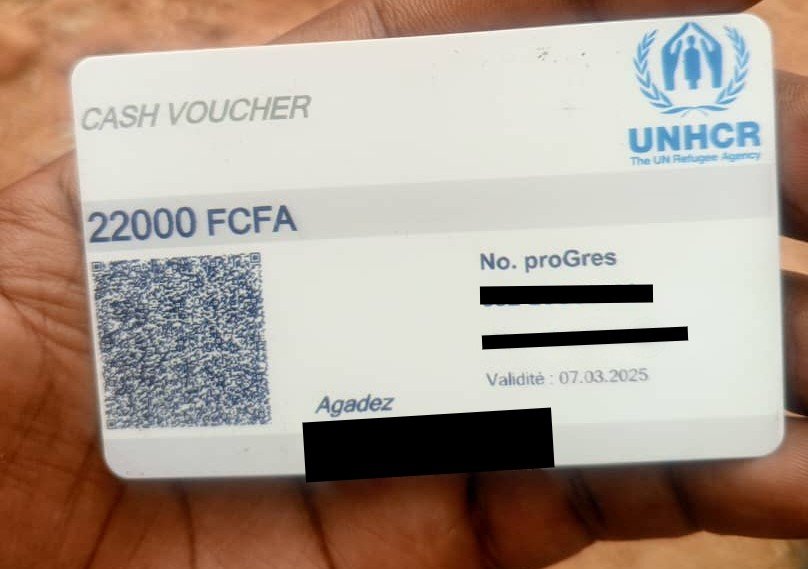The UNHCR will stop distributing food vouchers to refugees at Niger’s Agadez refugee center with a few exceptions following foreign aid cuts. The approximately 2,000 migrants housed at the facility fear they won’t be able to feed themselves under the new measure.
The final food vouchers worth 22,000 CFA francs (around 33 euros) were distributed in early June. Migrants living in the United Nations High Commissioner for Refugees (UNHCR) center in Agadez, Niger, will now have to provide for themselves.
"The decision to cut food aid early was particularly difficult," a UNHCR communications officer told InfoMigrants. "This transition had to be accelerated due to foreign aid cuts [particularly from the US]. So far, funding for UNHCR's operations in Niger in 2025, estimated at 138 million US dollars, is only 24 percent secured," she added.
Some 270 people identified as vulnerable
Food aid will only be distributed to individuals identified as vulnerable (pregnant women, unaccompanied children, sick or disabled people, etc.) beginning in July. "Some 270 people have been identified to continue receiving food assistance, based on their vulnerability," said the head of the UN agency.
It’s a small percentage of the approximately 2,000 migrants who are hosted by the Agadez humanitarian center. Most residents are from Sudan, but there are also a few Cameroonians and Central Africans.
The Agadez facility, opened in 2018, accommodates refugees and asylum seekers, most of whom were expelled by Algerian forces in the middle of the desert. "Among them, there are 800 registered refugees. The rest are asylum seekers awaiting processing of their applications [by the Nigerien authorities]," said Emmanuel Gignac, the former UNHCR representative in Niger, in an interview with InfoMigrants in April.
Read AlsoNiger: Tensions running high among migrants at UNHCR center
Migrants can remain in the facility for years because of the time it takes Nigerian authorities to process their asylum applications – sometimes three or four years. They also remain because of integration difficulties. Migrants have been protesting daily for over 250 days to demand their departure from the Agadez center and eventual transfer to another location or a third country. The situation in the camp has become explosive in recent months.
The UNHCR focuses on integration
To say the latest announcements have created a wave of panic and reinforced migrants' distrust of institutions would be an understatement. "Everyone is worried," said Daniel*, a Cameroonian asylum seeker who has been living in Agadez for four years. "We wonder how we'll feed ourselves in the upcoming months when there's very little work for us in the region."

The young man in his thirties found a small job in an air conditioning workshop in the city. "I'm paid for each job: if there's work, good; otherwise, I don't make any money," he said. Daniel earns 2,500 CFA francs (nearly four euros) when he works from 8 am to 8 pm. It's a paltry sum, which barely allows him to survive. "Some don't even have that. There are very few opportunities in Niger; priority is given to Nigeriens in all professions," said the Cameroonian. "It's a life of subsistence here."
Many migrants say they feel stuck in Agadez. When a resident of the center wishes to travel outside of Agadez, they must have a document signed by the Regional Directorate of Civil Status. Some migrants have tried to settle elsewhere but have been stopped on the road and sent back to the facility by the authorities.
Read AlsoNGO estimates more than 30,000 migrants deported by Algeria to Niger in 2024
The UNHCR says it "hears these concerns and takes them very seriously" but insists on "greater autonomy" for migrants through integration into the Nigerien society. "We encourage asylum seekers and refugees to take advantage of the vocational training opportunities made available to them, as well as the income-generating activities offered," said the UN agency.
According to the agency, "dozens of vocational training positions remain available for refugees at the regional level". In addition, ten hectares of land have been made available to exiles for agricultural activities.
"In 2024, 213 people who had expressed a wish to participate in the automation program – refugees and members of host communities – have already benefited from various initiatives," said the UNHCR’s press officer. "Local integration appears to be the option that is currently available to the vast majority of refugees," she said.
*Name has been changed at the request of the person concerned.
